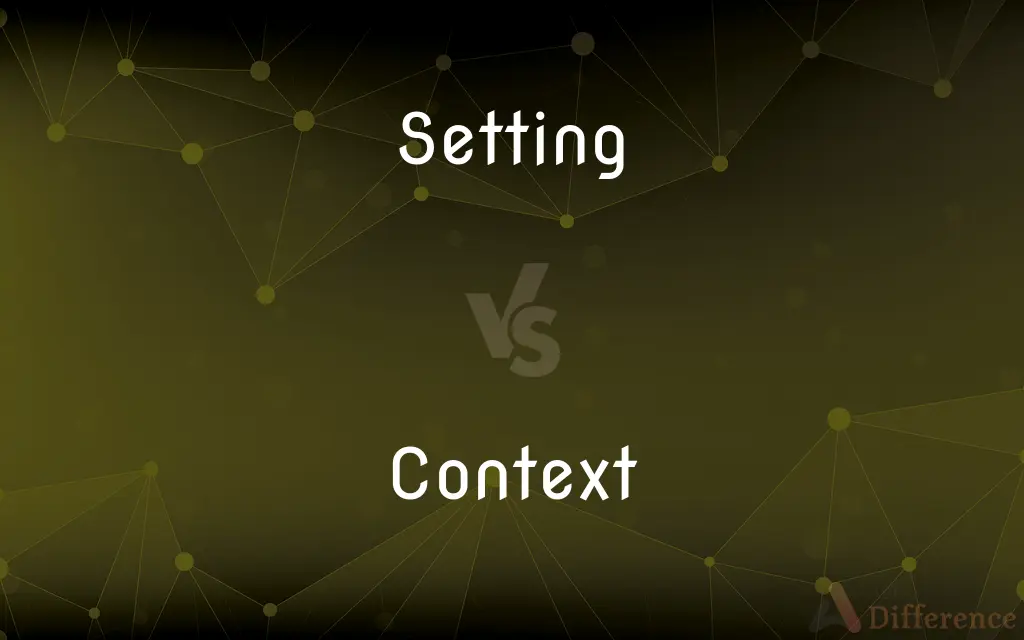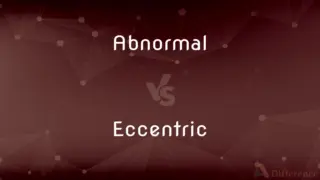Setting vs. Context — What's the Difference?
Edited by Tayyaba Rehman — By Maham Liaqat — Updated on March 12, 2024
Setting refers to the time and place of a story, grounding it in a specific environment, while context encompasses broader cultural, historical, and social factors influencing its creation and reception.

Difference Between Setting and Context
Table of Contents
ADVERTISEMENT
Key Differences
Setting is a narrative element defining the physical location, time period, and atmosphere in which a story takes place, directly impacting the plot and character development. Context, on the other hand, relates to the circumstances and conditions that surround the production and interpretation of a text, including historical, cultural, and social influences.
While the setting can influence characters’ behaviors and the story’s mood, providing a backdrop for the narrative events, context helps readers understand deeper meanings and themes, offering insights into why a story unfolds in a certain way and its relevance to real-world issues or themes.
A story’s setting can be fictional or real, detailed or vague, serving to immerse readers in the story’s world. Context goes beyond the text, involving the author’s background, the period during which the work was written, and the societal norms or events that may influence the narrative’s direction and reception.
Understanding a story’s setting is crucial for visualizing and experiencing the narrative as the author intended, making the environment an active component of the story. Understanding the context is essential for grasping the subtleties of the narrative, such as its commentary on societal issues, historical events, or cultural dynamics.
While setting is a tangible aspect of a story that readers can directly observe through descriptions and events, context requires external knowledge and research to fully appreciate, involving analysis of factors beyond the text itself.
ADVERTISEMENT
Comparison Chart
Definition
The time and place where a story occurs.
The broader circumstances surrounding the creation and interpretation of a story.
Influence on Story
Affects characters’ actions and plot development.
Affects understanding of themes and meanings.
Components
Location, time period, atmosphere.
Historical, cultural, social influences.
Reader Interaction
Directly observed within the text.
Requires external knowledge and analysis.
Purpose
To ground the narrative in a specific environment.
To provide insight into the text’s deeper meanings and relevance.
Compare with Definitions
Setting
The specific location and time where a story takes place.
The setting of The Great Gatsby is New York in the 1920s, reflecting the extravagance and moral ambiguity of the Jazz Age.
Context
Encompasses the conditions and circumstances influencing a story's creation and interpretation.
The context of post-war disillusionment is crucial to understanding the disillusionment in The Sun Also Rises.
Setting
Varies in specificity, from detailed historical periods to ambiguous fantasy worlds.
The intricate setting of Middle-earth in The Lord of the Rings is foundational to its epic narrative.
Context
Connects the narrative to broader societal, historical, and cultural issues.
The context of the Cold War era is essential for understanding the paranoia and themes in The Crucible.
Setting
Can influence the mood and theme of the story.
The dark, oppressive setting of 1984 enhances the story’s themes of surveillance and authoritarianism.
Context
Includes the author's personal background and the period in which the work was created.
Understanding Mary Shelley's life and the dawn of the Industrial Revolution is key to grasping the themes in Frankenstein.
Setting
Creates the backdrop against which characters act and the story unfolds.
The desolate moors in Wuthering Heights mirror the turbulent emotions of the characters.
Context
Requires external knowledge beyond the text for a deeper understanding.
Knowing the context of racial tensions in America enhances the impact of To Kill a Mockingbird.
Setting
Is often described through vivid imagery to enhance the reader's immersion.
The setting of the island in Lord of the Flies evolves from a paradise to a symbol of chaos.
Context
Influences readers' perceptions and interpretations of the narrative.
The feminist context of the 1970s adds depth to the reading of The Bell Jar by Sylvia Plath.
Setting
The position, direction, or way in which something, such as an automatic control, is set.
Context
The part of a text or statement that surrounds a particular word or passage and determines its meaning.
Setting
The context and environment in which a situation is set; the background.
Context
The circumstances in which an event occurs; a setting.
Setting
The time, place, and circumstances in which a narrative, drama, or film takes place.
Context
The surroundings, circumstances, environment, background or settings that determine, specify, or clarify the meaning of an event or other occurrence.
In what context did your attack on him happen? - We had a pretty tense relationship at the time, and when he insulted me I snapped.
Setting
(Music) A composition written or arranged to fit a text, such as a poetical work.
Context
(linguistics) The text in which a word or passage appears and which helps ascertain its meaning.
Without any context, I can't tell you if the "dish" refers to the food, or the thing you eat it on.
Setting
A mounting, as for a jewel.
Context
(archaeology) The surroundings and environment in which an artifact is found and which may provide important clues about the artifact's function and/or cultural meaning.
Setting
A place setting.
Context
(mycology) The trama or flesh of a mushroom.
Setting
A set of eggs in a hen's nest.
Context
(logic) For a formula: a finite set of variables, which set contains all the free variables in the given formula.
Setting
Present participle of set
Context
(obsolete) To knit or bind together; to unite closely.
Setting
The time, place and circumstance in which something (such as a story or picture) is set; context; scenario.
Context
(obsolete) Knit or woven together; close; firm.
Setting
The act of setting.
The setting of the sun
The setting, or hardening, of moist plaster of Paris
Context
Knit or woven together; close; firm.
The coats, without, are context and callous.
Setting
A piece of metal in which a precious stone or gem is fixed to form a piece of jewelry.
Context
The part or parts of something written or printed, as of Scripture, which precede or follow a text or quoted sentence, or are so intimately associated with it as to throw light upon its meaning.
According to all the light that the contexts afford.
Setting
A level or placement that a knob or control is set to.
The volume setting on a television
Context
To knit or bind together; to unite closely.
The whole world's frame, which is contexted only by commerce and contracts.
Setting
The act of marking the position of game, as a setter does.
Context
Discourse that surrounds a language unit and helps to determine its interpretation
Setting
Hunting with a setter.
Context
The set of facts or circumstances that surround a situation or event;
The historical context
Setting
Something set in, or inserted.
Setting
A piece of vocal or choral music composed for particular words (set to music).
Schubert's setting of Goethe's poem
Bach's setting of the Magnificat
Setting
The mounting of a play, etc., for the stage.
Setting
The direction of a current of wind.
Setting
That disappears below the horizon
The setting sun
Setting
The act of one who, or that which, sets; as, the setting of type, or of gems; the setting of the sun; the setting (hardening) of moist plaster of Paris; the setting (set) of a current.
Setting
The act of marking the position of game, as a setter does; also, hunting with a setter.
Setting
Something set in, or inserted.
Thou shalt set in it settings of stones.
Setting
That in which something, as a gem, is set; as, the gold setting of a jeweled pin.
Setting
The time, place, and circumstances in which an event (real or fictional) occurs; as, the setting of a novel.
Setting
The context and environment in which something is set;
The perfect setting for a ghost story
Setting
The state of the environment in which a situation exists;
You can't do that in a university setting
Setting
Arrangement of scenery and properties to represent the place where a play or movie is enacted
Setting
The physical position of something;
He changed the setting on the thermostat
Setting
A table service for one person;
A place setting of sterling flatware
Setting
Mounting consisting of a piece of metal (as in a ring or other jewelry) that holds a gem in place;
The diamond was in a plain gold mount
Setting
(of a heavenly body) disappearing below the horizon;
The setting sun
Common Curiosities
How does setting affect a story?
Setting impacts the plot, characters, mood, and themes by providing a specific backdrop for the events.
How can one learn about the context of a story?
Through research on the author's life, the historical period of the story's creation, and the societal norms or events at the time, among other external factors.
Why is context important in understanding a story?
Context offers insights into the story’s deeper meanings, themes, and its relevance to real-world issues, enhancing comprehension and appreciation.
How does a writer choose a story's setting?
Based on narrative needs, thematic relevance, personal interests or experiences, or to reflect or contrast with certain societal or historical contexts.
What is the difference between setting and context in literature?
Setting is the time and place of the story, while context includes broader factors influencing its creation and interpretation.
Can the setting of a story also be considered part of its context?
While setting is primarily within the text, it can reflect contextual elements, like historical periods or cultural settings, linking it indirectly to context.
Is it possible for a story to change context over time?
Yes, as societal norms, historical understanding, and cultural values evolve, the context in which a story is interpreted can also change.
How do authors use setting to enhance a story?
By using detailed descriptions, integrating the setting with the plot and character development, and leveraging it to support the story’s mood and themes.
What role does context play in literary analysis?
It's central to literary analysis, providing the framework for interpreting a story's themes, character motivations, and societal commentary.
Can the setting influence the context of a story?
Indirectly, yes. The setting can mirror broader societal or historical contexts, influencing how a story is created and received.
Do all stories have a clearly defined setting and context?
Most stories have a defined setting, but the clarity and detail can vary. Context, though always present, may require more effort to discern, especially in works with complex or nuanced themes.
How does context influence readers' interpretation of a story?
It shapes understanding by highlighting the significance of themes, characters' actions, and narrative choices in relation to external factors like history, culture, and social issues.
Do readers need to understand the context to enjoy a story?
While not always necessary for enjoyment, understanding the context can greatly enrich the reading experience and appreciation of the story’s depth.
Can the context of a story affect its popularity or reception?
Absolutely. Stories often resonate more or differently depending on their contextual relevance to current events or cultural climates.
Share Your Discovery

Previous Comparison
Proud vs. Arrogant
Next Comparison
Abnormal vs. EccentricAuthor Spotlight
Written by
Maham LiaqatEdited by
Tayyaba RehmanTayyaba Rehman is a distinguished writer, currently serving as a primary contributor to askdifference.com. As a researcher in semantics and etymology, Tayyaba's passion for the complexity of languages and their distinctions has found a perfect home on the platform. Tayyaba delves into the intricacies of language, distinguishing between commonly confused words and phrases, thereby providing clarity for readers worldwide.
















































